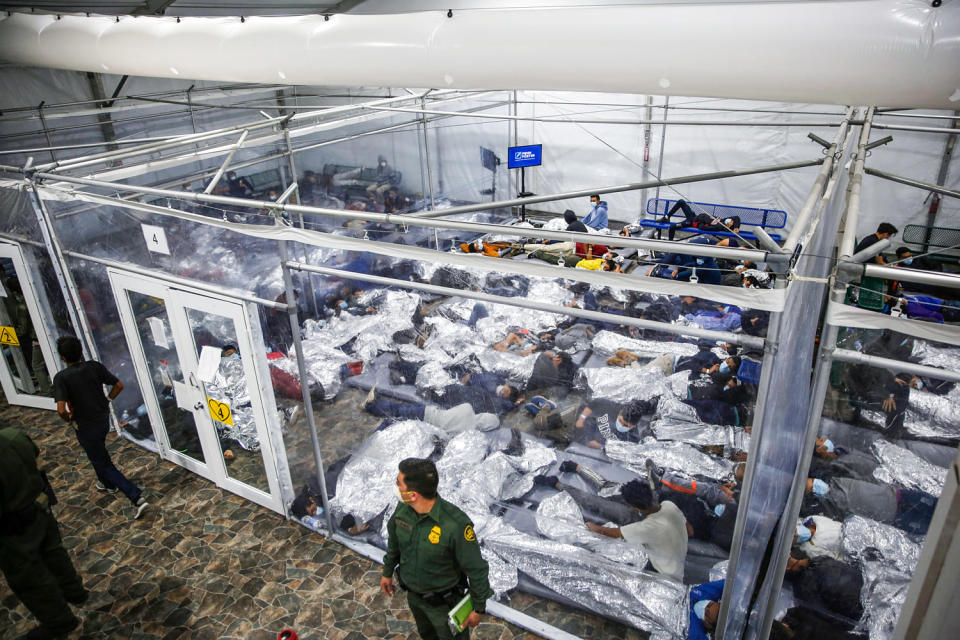McAllen, Texas — Twenty-four hours after President Biden announced his new executive action on the southwest border, migrants expressed confusion and U.S. officials on the border questioned how the rule will be enforced without additional funding from Congress.
Under the new policy, anytime the seven-day average of illegal border crossings breaches 2,500, migrants entering the U.S. between legal ports of entry — with some exceptions — will be banned from claiming asylum and deported.
Three agents involved in enforcing the measure told NBC News there is confusion over what to do with thousands of migrants who will now be deported but whose countries will not accept them back, such as migrants from Venezuela, China and elsewhere in the Eastern Hemisphere.
Several Department of Homeland Security officials responsible for carrying out the order, speaking on the condition of anonymity, said there is concern that detention facilities and processing centers for migrants could quickly become overcrowded.
Since Biden’s executive action announcement, WhatsApp chat groups for migrants thinking about coming to the U.S. have been abuzz with questions and concerns about how the policy will play out.
“What is going to happen to the migrants who are walking to the United States and those who are still leaving the jungle?” one chat group participant asked.
“Can someone tell me if this is good or bad news?” a participant in a separate chat group said with a link to a Telemundo news report. “I have my trip scheduled for the end of the month.”

It is currently unclear where the Biden administration will hold a vast number of detained migrants — possibly tens of thousands — until they are deported. Immigration and Customs Enforcement does not have the capacity or authority to indefinitely detain migrants.
Over the past year, for example. the U.S. has deported roughly 62,000 people per month on average. At the same time, more than double that number have crossed the border illegally each month.
It is also unclear how many deportees other countries will accept. Mexico has agreed since January 2023 to take back 30,000 migrants from Cuba, Haiti, Nicaragua and Venezuela per month. But some months the number of nationals from those countries has exceeded 30,000.
Venezuelans, in particular, have crossed the border in large numbers and claimed asylum, citing fears of repression from the Maduro regime. It is unclear how those Venezuelans will be handled by the U.S. in the future if Mexico does not take them back since they cannot claim asylum and cannot be deported.
On a call with reporters on Wednesday, two senior DHS officials took questions on how they would handle the migrants from countries that would not take them back.
One of the officials said that migrants from the Eastern Hemisphere are not exempted from the new order, “but we also can’t indefinitely hold individuals in custody.”
“This is … precisely why we keep noting that there are limits to what can be accomplished through executive action,” the official said. “We’re clear-eyed about that.”
The other senior DHS official said the agency will be surging resources to the border in the coming weeks. He said the new policies should reduce the time it takes to process migrants by 30 to 45 minutes, cutting down several hours, in order to free up more space to hold migrants in custody.
“Anything we can do to bring down processing time gives us more capacity,” the official said.
The officials also said migrants will now be given only four hours to find a lawyer to represent them before U.S. Citizenship and Immigration Services officers who are making the decision about whether they meet a new, higher standard to seek protection in the United States.
Some migrants have already been deported since the new policy went into effect at midnight Wednesday, the DHS officials added.
Exactly how the policy will impact the border and individual migrants will depend on how many migrants continue to arrive.
“We are just going to have to wait and see how this plays out,” said one of the senior DHS officials.
Meanwhile, some Democrats and many immigration advocacy groups have continued to criticize the executive order. The ACLU said it is still reviewing the order but plans to take legal action to stop it.
In a rally in front of the U.S. Capitol on Tuesday, Congresswoman Pramila Jayapal said, “I am profoundly disappointed in this executive order — it is a step in the wrong direction.”
Biden has said he cannot stand by and do nothing as the number of undocumented migrants crossings southern border has reached nearly 10 million during his administration. Earlier this year, pro-Trump Republicans in Congress blocked a sweeping bipartisan border security bill that Biden said would have eased the crisis.
This article was originally published on NBCNews.com


